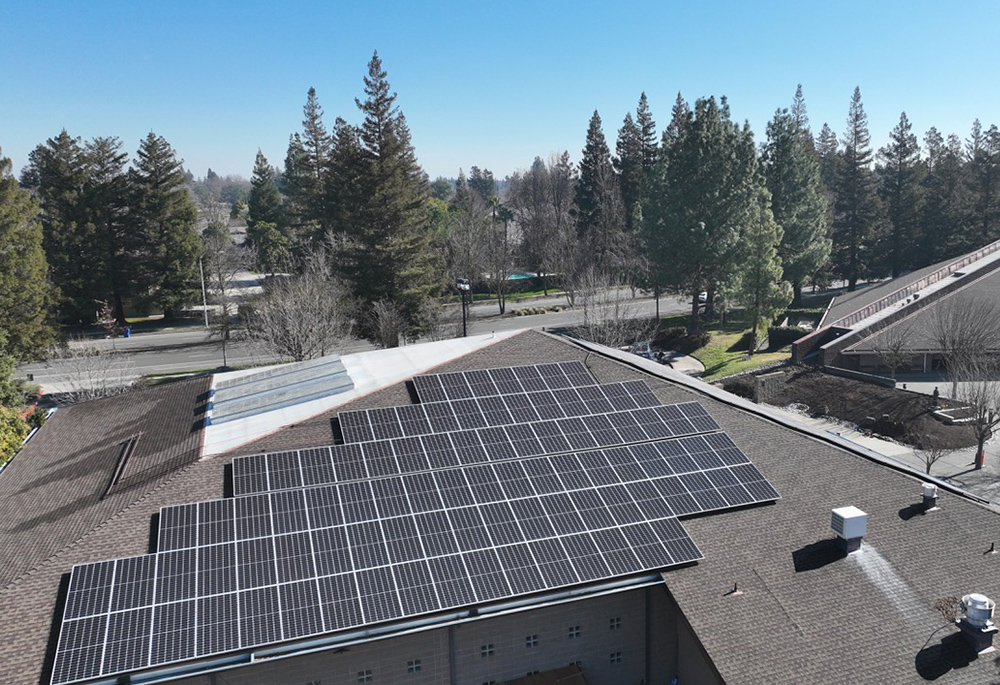
A total of 171 solar panels sit atop the Memorial Center at St. Anthony Parish in Sacramento, California. The array provides electricity to power the entire parish campus. (Courtesy of Kim-Son Ziegler)
It began with a bright idea.
In early 2020, members of the newly formed creation care committee at St. Anthony Parish, in Sacramento, were exploring ways to raise ecological issues within the parish. They had begun education efforts around Pope Francis' encyclical "Laudato Si', on Care for Our Common Home" for themselves and the rest of the parish, including through the weekly bulletin. Now they were looking for an anchor project to put Catholic teaching about the environment into action.
They decided to install solar panels on the roof of the parish's Memorial Center, and by May 2022, the full 82-kilowatt, 181-panel system was ready to power up, producing enough energy to cover the parish's electricity needs. But the solar project also served as a first step toward flipping the switch on a wider effort to electrify the entire Sacramento Diocese in living out the message of Laudato Si'.
Within months, a new creation care committee was established at the diocesan level, and California's geographically largest diocese enrolled in the Vatican's Laudato Si' Action Platform.
The work of the St. Anthony parishioners to power up their parish and diocese was recognized in February by Interfaith Power & Light, which named the parish one of its 2023 "Cool Congregations" winners and recipient of the Renewable Role Model award.
"This shows the big impact that can be made by a committed group of people at one congregation," Susan Stephenson, IPL executive director, told EarthBeat in an email. "St. Anthony's Laudato Si committee served as a role model and driver for climate action across their whole diocese!"
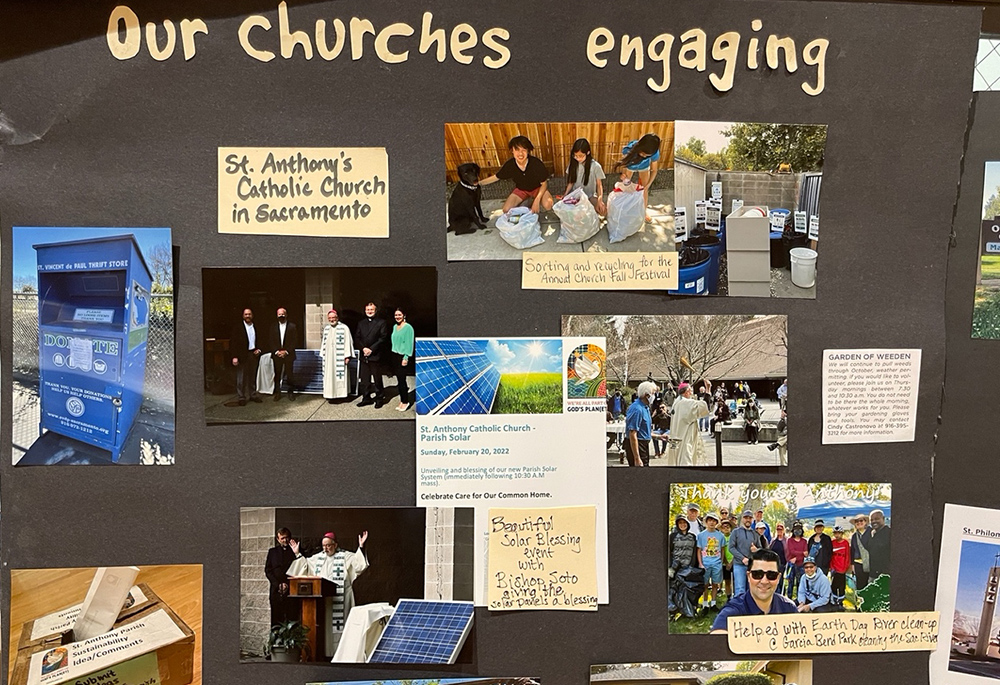
Bulletin boards display parish-led efforts to care for the environment at the Sacramento Diocese's Laudato Si' kick-off event on Sept. 9, 2022, at St. Anthony Catholic Church, in Winters, California. (Courtesy of Kim-Son Ziegler)
Solar at St. Anthony
The creation care committee at St. Anthony grew out of its social justice ministry. Parishioners like Kim-Son Ziegler felt the need to give greater attention to environmental issues, especially as the impacts of climate change — including heat, drought and wildfires — have become more stark throughout the Golden State.
The idea of bringing solar power to the parish was always appealing to Ziegler, the parish environmental lead and a project manager for a local utility. He had panels installed at his home and thought they could be a good fit for St. Anthony, too — a visible reflection of faith in action.
Moving to solar energy would also reduce the parish's reliance on fossil fuels that contribute to climate change. The parish had considered adding solar in the past, but the costs were prohibitive. Now, they felt ready to move forward, and Fr. Mieczyslaw "Mitch" Maleszyk asked Ziegler to oversee the project. The solar array was installed in two phases, the first providing power to the Memorial Center and the second to the rest of the parish campus. The parish self-funded the project through donors, with each phase costing roughly $100,000.
Altogether, the solar array provides 100% of the parish's current electricity needs and was scaled to cover future growth, as well. Already, the system has saved the parish $17,000 annually in energy costs and offsets 80 tons of carbon emissions each year — both greater than initial estimates.
After Sunday Mass on Feb. 20, 2022, Sacramento Bishop Jaime Soto led a blessing of the solar array, sprinkling holy water on a panel on the ground and others already installed on the Memorial Center roof.
"Through the works of our hands and the help of technology, we cooperate with the Creator to improve the Earth as a dwelling place, as the common home, of the human family," the bishop said at the blessing.
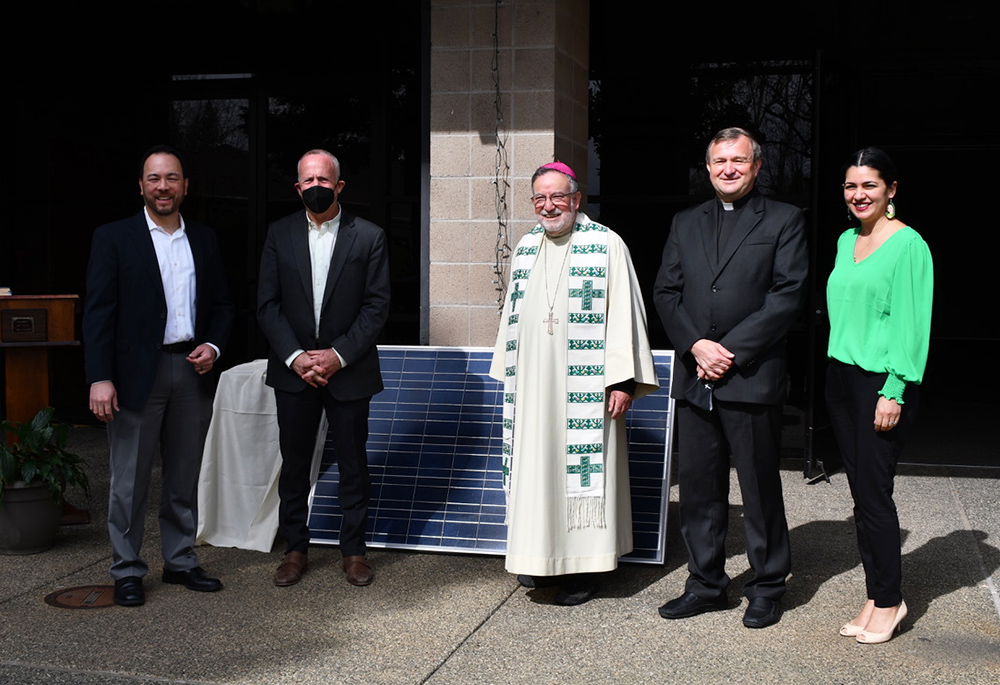
Bishop Jaime Soto blessed the solar panel installation at St. Anthony Parish, in Sacramento, during a prayer service Feb. 20, 2022. Also pictured, from left: Kim-Son Ziegler, parish environmental lead; Mayor Darrell Steinberg; pastor Fr. Mieczyslaw "Mitch" Maleszyk; and Gabby Trejo, Sacramento ACT executive director. (Courtesy of Kim-Son Ziegler)
Creation care in the diocese
As the solar project moved forward, St. Anthony parishioners were meeting with other creation care groups in the diocese to brainstorm ways to partner and build off each other's work.
"We noticed that we were operating in silos. Each parish was doing good stuff, but we weren't integrated at all," said Betsy Reifsnider, a member of the social justice committee at St. Francis of Assisi Parish in midtown Sacramento.
They became interested in getting the Sacramento Diocese more involved, primarily by elevating Laudato Si' in its own ministries and in providing an outlet for parishes to meet and share resources, said Reifsnider, who before retiring worked with the Sierra Club and as the first environmental justice coordinator for the Diocese of Stockton, California.
"We would probably learn more if we could talk with one another and find out what they were doing and the kind of challenges that they had and what was working in their parishes," she said.
But they didn't see much action around creation care coming from the diocese.
Advertisement
Shortly after Laudato Si' was released in June 2015, Soto and Stockton Bishop Stephen Blaire met with members of the California Legislature to discuss Catholic teaching around the environment and climate change. And in 2019, Soto joined his fellow California bishops in issuing a pastoral statement applying the encyclical to the California context. The document outlined a number of action steps, including for dioceses.
"We thought, well, this is wonderful. And then nothing really happened at the diocesan level," Reifsnider said.
Ziegler saw the invitation for Soto to bless St. Anthony's solar installation as an inroad to engage the diocese more on environmental issues. Another was through Sacramento ACT, the local affiliate of the multifaith justice group Faith in Action that works with more than 50 congregations in Sacramento County.
In the last decade, Sacramento ACT began hearing from its members a desire for it too to become more engaged around climate change. In response, it formed a committee and launched a listening tour to hear directly from parishes and congregations how climate change is impacting their lives.
"It's impacting the way their kids learn. It's affecting their health because they're breathing fumes in homes. It's impacting transportation," said Gabby Trejo, Sacramento ACT executive director. "Climate is impacting every issue, social issue, that we work on."
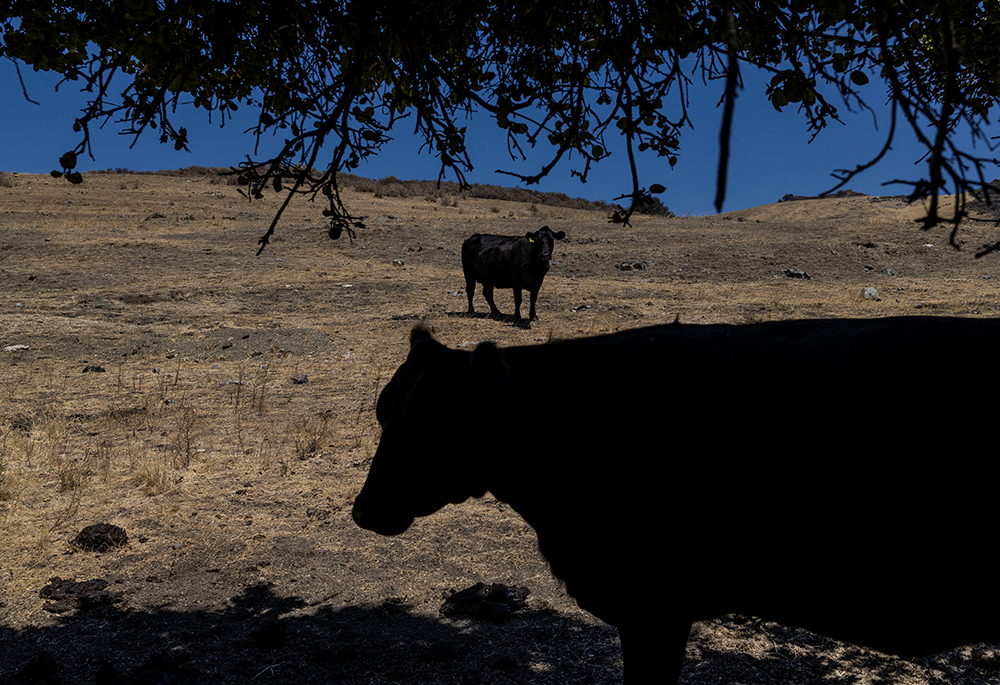
Livestock is seen in a dry field Aug. 15, 2022, near Sacramento, California. (CNS/Reuters/Carlos Barria)
Along with helping connect parishes around creation care, Trejo, who is also Catholic, helped them engage the diocese. Shortly after Miriam Sammartino took over as director of Catholic Charities and Social Concerns, they scheduled a meeting with her.
That first conversation was "very harsh," Sammartino told EarthBeat, as the parishioners spoke bluntly about the lack of movement they saw on Laudato Si' from their church leadership.
"When parishioners are frustrated that we as a diocese aren't providing an opportunity for them to live out their faith in the way that they're being called to, then that's a big [red] flag for me," she said.
Sammartino relayed those frustrations to Soto, telling him, "I think it's time to respond."
"And he was very open to it," she added. "I think he's been very interested in being more active in care for creation. It just, for whatever reason, hadn't happened."
Along with frustrations, the parishioners outlined several steps for the diocese to take. In addition to a diocesan creation care committee, they asked the diocese to host events and speakers on faith and ecology, and for it to provide spaces to gather and discuss how to start creation care teams in their parishes.
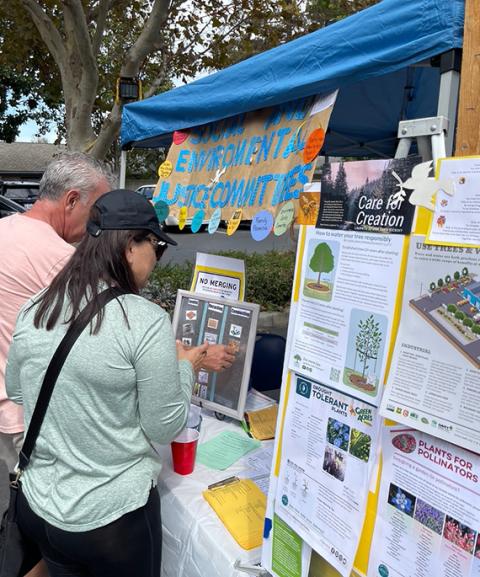
Parishioners stop at the social and environmental justice committee's activity booth at the St. Anthony Parish Fall Festival Sept. 17, 2022, in Sacramento. (Courtesy of Kim-Son Ziegler)
Another major ask was for the Sacramento Diocese to sign up for the Laudato Si' Action Platform. The program, unveiled by Francis in May 2021 and officially launched later that year, outlines seven thematic action-oriented goals for all types of Catholic institutions — from dioceses and parishes, to religious congregations, schools, hospitals, businesses and families — to achieve over the course of seven years in the spirit of the encyclical's teachings on integral ecology and ecological conversion.
Sammartino, who heads the new diocesan creation care committee, said the Laudato Si' Action Platform has been "really helpful" in not just learning more about environmental issues like climate change and how they relate to what it means to be Catholic, but also in highlighting "where are the opportunities for us to really engage with our parishioners" around ecological challenges.
"There is a foundation in our Catholic teaching, and this is what we're trying to do," she said.
Laudato Si' in action
The meeting with the social concerns office the only meeting the parishioners had with the diocese. They also met with the bishop.
Trejo, who holds monthly meetings with Soto, brought several parishioners with her during one of the sessions. There, they shared ideas and brainstormed possible events and initiatives the diocese could take up and how it can support parish efforts.
Trejo recalled Soto being "excited about the energy that parishioners brought to the table."
Ziegler, now part of the diocesan creation care committee, said he left that meeting feeling "that the bishop is behind [us]. He's open to our ideas, he's engaging with us, and this is not something that's just going to quietly go away."
In September, during the Season of Creation, the Sacramento Diocese officially kicked off its entry into the Laudato Si' Action Platform with an event at St. Anthony Catholic Church, in rural Winters.
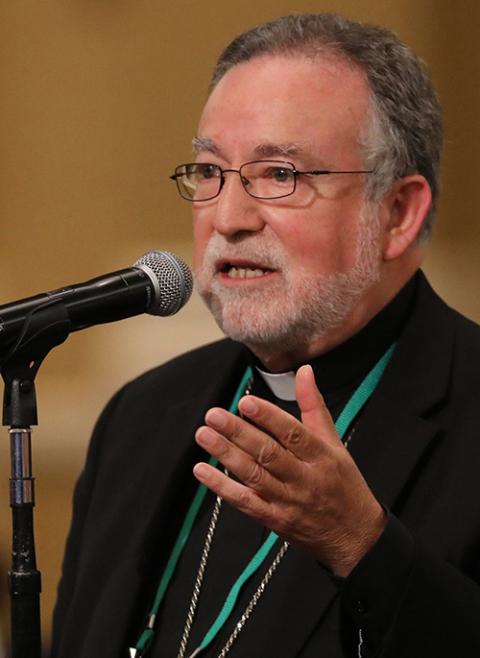
Bishop Jaime Soto of Sacramento, California, is seen in this 2019 file photo. (CNS/Bob Roller)
"This is a long marathon, not a sprint," Soto said of the multiyear initiative, per the diocesan magazine the Catholic Herald.
To aid those efforts, the diocese has produced a care for creation parish toolkit, in both English and Spanish, that gives background on the seven goals of the Laudato Si' Action Platform, information about environmental justice and resources from Catholic Climate Covenant on creating creation care teams.
The diocese has initially focused on three of the action platform's seven goals — response to the cry of the earth, response to the cry of the poor, and ecological education — and created reflection guides on each for parish pastoral councils.
Sammartino told EarthBeat that education remains a main priority. They have used their Spanish radio show, "Cultivating Hope," to bring awareness to issues around climate change and the environment. How they speak about it affects whether it's heard, she added, as they've found using the words "climate change" can be less effective in some parts of the diocese compared to talking about how water shortages affect communities and farming, how air pollution can impact growing fetuses, and how heat waves put elderly people and children at greater risk.
The Sacramento Diocese has also organized regional meetings on creation care for the northern part of the diocese, the Sacramento area and the Yolo-Solano counties in its southern boundaries. In addition, it has added to the liturgical calendar Rogation Days (May) and Ember Days (September) to mark periods of planting and harvesting. An emergency preparedness virtual course is in the works.
In May an ecumenical prayer service will kick off Laudato Si' Week.
Catholic parishioners who spoke with EarthBeat said they have been surprised and excited by the pace the diocese has responded.
"But there was a lot of legwork and a lot of discussions that happened beforehand," said Reifsnider, adding "I think it's very important that we keep moving forward because it's going to be so easy to say 'Oh, been there, done that. Check the box.' "
She said she would like to see the diocese next create a position specifically on creation care and environmental justice, similar to the Environmental Justice Project in the Diocese of Stockton's Catholic Charities. Others have discussed the possibility of adding solar panels at other parishes or even charging stations for electric vehicles.
Trejo, the community organizer, credits the parishioners at St. Anthony and elsewhere with spurring the diocese to action. "It was this clarity about who Pope Francis was calling us to be in this moment and who they are as parish[es] wanting to step into their leadership."
Added Reifsnider, "There are so many issues and initiatives that are coming at the diocese, diocesan staff and the bishop, that unless you have people in the parishes who are really pushing to have Laudato Si' elevated to be an important part of the work of the diocese, it might not happen."








